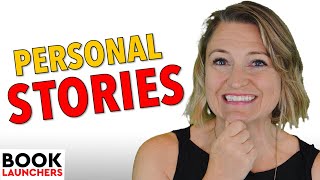Texas Holdem Tips Video Source & Information:
When you’re writing a non-fiction book – whether it’s a memoir, self-help, or a business book, including your personal story adds value. Your personal story makes your book one that only you can write. It also provides context for your reader to relate to you and trust you. It can be difficult, however, to write your personal story without feeling like you’ll make other people mad or upset that you talked about them in your book. In this video author and founder of Book Launchers, Julie Broad, explains three different strategies for handling personal stories that talk about other people in your book.
Subscribe for our weekly videos to help you self-publish and sell your book on Amazon, Kindle, Bookstores, Kobo and beyond:
http://www.youtube.com/c/booklaunchers?sub_confirmation=1
If you are interested in getting a professional team to help you self publish your book, visit Book Launchers website:
http://booklaunchers.com/
Connect with us on social media:
Tweets by BookLaunchers
http://facebook.com/booklaunchers
http://instagram.com/booklaunchers
Source: YouTube







Currently writing my first narrative non-fiction book. I will use pseudonyms to avoid any future issues.
I referred to my sister by her first name only in my book, she was only referenced in the preface about how I got interested in the topic for the book.
Ok mine is funny due to it being fiction, all of my friends were asking to be in my book, it wasn't oh don't say anything about me it was, Oh cool can I be in it. So what I ended up doing was sense my book was horror, I told them okay you can be in it as long as you let me kill you. Every friend I had was like heck ya go or it. So that's where I got all my victims for my book. And I let them read the part that they got killed in before I used it in the story so if they did not like it I would change it and everyone loved it.
Great video. Figuring out how to interject your own story appropriately without bias and judgement is hard. Hard to judge if people are sick of hearing my story or if it’s interesting to them. Always interesting to me🙂
I am considering writing of my time as Father Christmas. My problem is not having to change names but not being able to remember them in the first place!
Presumably, the caution applies to companies as well as real people.
Oh my God I love Texas Hold 'Em.
Hey I wanna urgently know whether you are a pantser or plotter????🔥🔥🔥🔥🔥🔥🔥🔥🔥🔥🔥🔥🔥🔥🔥🔥
I recently launched my book giving imaginary names.
I think you might like this book – "FIRST GENERATION LAWYER: A Lawyer's Journal" by Y. K. SIKRI.
Start reading it for free: https://amzn.in/e5e5mRd
The intro of my matching vegan food with beer book is the only point at which I mention my own personal life story beyond incredible experiences of matching a Chimay rouge Belgian ale with mock lamb vindaloo and the like. I divulge how I discovered beer and how I made the decision to adopt a fully plant-based diet and there are two things concerning me a little. Number one: I mention a decision made by the family left me behind in this life at a very important formative moment following high school graduation. Suffice it to say mum hasn't read this chapter yet and I hope she never does. Number two: My book is based loosely around a similar book called The Brewmaster's Table by Garrett Oliver. This is a hugely important title for aspiring beer professionals everywhere however it is full of venison, game, all manner of fish, steak and other dead stuff. Throughout my book I frequently refer back to Oliver and his work which should be fine. But at the end of the introduction I thank him for the inspiration while suggesting he eat more vegetables. I have no idea how that will go down once my book goes to market.
Thanks Julie ..El inmigrante venezolano